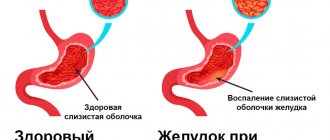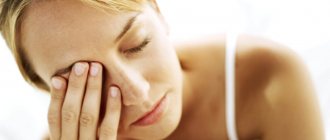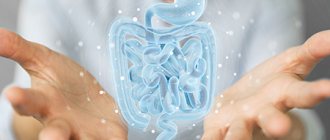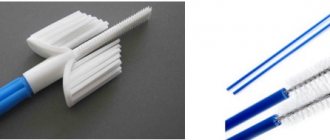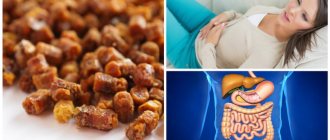Stool disorder can manifest itself as a result of disruption of the gastrointestinal tract; disruptions occur due to intoxication, concomitant diseases or food poisoning. Let's find out whether you can drink coffee if you have diarrhea or constipation.
Unfortunately, sometimes health fails. Abnormal bowel movements that catch a person at the wrong moment disrupt all plans. They bring a lot of inconvenience and unpleasant sensations: bloating, pain. As a result, you have to carefully select foods and drinks to consume. Some should be avoided altogether, including strong natural coffee. After all, coffee does not have a fixing effect for diarrhea. On the contrary, it has an irritating effect on the intestinal walls and stimulates loose stools.
Causes of diarrhea, diarrhea, why do frequent loose stools appear?
Stool disorder in the form of diarrhea and severe diarrhea can occur against the background of:
1 increased intestinal motility: due to frequent contractions of the intestinal walls, food leaves the body before the nutrients it contains can be absorbed, which negatively affects the functioning of internal organs and the general well-being of a person;
2 consuming large amounts of liquid or raw vegetables/fruits/berries during the day can lead to severe diarrhea;
3 damage or inflammation of the mucous membrane of the digestive tract: if there is damage to the mucous membrane of the gastrointestinal tract, the liquid ceases to be absorbed in full, which leads to its stagnation in the intestinal lumen and dilution of the stool;
4 viral, bacterial, fungal infection: pathogenic microorganisms not only irritate the walls of the stomach and intestines, but also poison the body with their waste products, causing stool upset, severe diarrhea, bloating, flatulence, abdominal pain, nausea;
5 parasitic infestation;
6 acute intoxication caused by the consumption of low-quality or expired food, poisonous plants, highly effective medications, chemical or narcotic substances, strong alcoholic drinks, smoking mixtures;
7 non-compliance with a therapeutic diet during the period of exacerbation of chronic diseases of the gastrointestinal tract, all these are causes of diarrhea and diarrhea, frequent loose stools;
8 unbalanced diet;
9 imbalance of intestinal microflora;
10 Failure to observe basic hygiene rules can also lead to diarrhea.
Causes of diarrhea
The causes of diarrhea may be the following:
- Poisoning from low-quality products.
- Exacerbation of gastrointestinal diseases as a result of dietary disorders.
- Infection with parasites that infect the intestines.
- Excessive consumption of foods containing sucrose.
- Bacterial lesions of the gastrointestinal tract.
With diarrhea, the gastrointestinal tract malfunctions and the absorption of fluid and microelements is disrupted. Loose stools occur when:
- Damage to the mucous membranes of the stomach and intestines. If the mucous membrane is inflamed or its integrity is compromised, then fluid is retained in the intestines. And its excess does not allow the nutritional components to be properly absorbed. Feces are formed. Compounds are formed that develop excessive osmotic activity. A high glucose content, for example, contributes to disturbances in fluid metabolic processes and dilution of chyme.
- Infections with harmful bacteria or other microorganisms. Damage to the intestinal walls by bacteria leads to flatulence; pathogenic microorganisms also accumulate on the walls and cause disturbances in the passage of feces.
- Strengthening the peristalsis of contractions of the intestinal walls. Increased peristalsis has a negative impact on food absorption. Food is not digested as it should be due to rapid movement along the inner surface of the intestines.
- Increased amount of liquid in chyme and excess microelements.
Doctors strongly do not recommend drinking coffee if you have diarrhea. The drink will not only aggravate gastrointestinal disorders, but will also worsen the general condition of the patient. The patient will experience headaches, swelling, increased blood pressure, and heart rhythm disturbances.
If diarrhea continues for a long period of time, you should not self-medicate. Contact a specialist for help.
Types of diarrhea, what types of diarrhea are there?
Diarrhea has two mechanisms of occurrence:
1 consequence of failures in the processes responsible for the absorption of fluid by the intestine;
2 changes in intestinal motility, causing mechanical diarrhea.
Whenever mentioning diarrhea, one should keep in mind copious liquid feces, frequent urge to defecate, and decreased ability to retain intestinal contents for a long time. This condition is accompanied by characteristic symptoms: cramps and stabbing pain in the upper abdomen, blood streaks in the stool, nausea and vomiting, increased gas formation, dizziness and general weakness. Prolonged diarrhea leads to the loss of a large volume of fluid, leaching of useful substances, in particular minerals, and an imbalance of intestinal microflora. To make up for losses and maintain the level of water in the body at a level acceptable for normal life, it is necessary to provide the patient with plenty of fluids. First of all, it is recommended to use non-carbonated mineral water for this. You should not drink juices, tea or coffee, as these drinks carry the risk of worsening the situation.
Composition of green and black tea, is it possible to drink tea for diarrhea?
Green tea contains tannins, caffeine, amino acids and many vitamins, the most useful of which is vitamin B: the substance helps strengthen muscle tissue, eliminate cramps and spasms, including intestinal ones, stimulates metabolic processes and eliminates fluid stagnation in the body. Is it possible to drink green tea if you have diarrhea or severe diarrhea? Tannins in green tea play the role of a natural antiseptic and “fixer”: they neutralize pathogens, protect the gastrointestinal mucosa from damage and inflammation, and also have an astringent effect. Therefore, you can and should drink green tea when you have diarrhea.
Tea contains more caffeine than freeze-dried coffee, but it does not act as aggressively as its “brother” that comes from coffee beans: other substances that make up tea soften its effect, and it is also used for brewing tea. less “starting material” than when making coffee. You can drink tea when you have diarrhea; it can, together with other medications and diet, gradually neutralize and negate the effects of diarrhea.
Composition of coffee, can you drink coffee if you have diarrhea?
When roasting, coffee beans lose up to half of their nutrients. Of what does reach the consumer, tannin, a tannin that has a pronounced fixing effect, B vitamins, malic, citric and chlorogenic acids, which stimulate metabolic processes, trigonelin and caffeine deserve special attention. Causes of diarrhea after coffee: despite the fact that during roasting the amount of the latter sharply decreases, it is still sufficient to provide a stimulating effect on the nervous and vascular systems, as well as enhance intestinal motility. You can drink coffee for diarrhea, and in most cases, coffee for diarrhea becomes an auxiliary element for restoring normal stool, but you should know some of the features of drinking coffee for diarrhea. It should be noted that the positive effect of drinking coffee for diarrhea is observed only if the organs of the digestive tract function without interruption. If you have chronic gastrointestinal diseases in the acute stage, drinking coffee is not recommended. During remission, the drink can only be consumed in an unconcentrated form, preferably with the addition of milk or cream.
Chemical component of coffee
Despite all the warnings, coffee lovers do not stop drinking coffee if they have diarrhea. Thus exacerbating the problem. Yes, the benefits of the drink are striking, but in some situations it can be harmful. To understand how its effect on body systems occurs, it is necessary to study its components.
Coffee beans contain large amounts of caffeine. The component stimulates the nervous system, gives vigor and physical endurance to a person. Strong espresso contains a substance rich in B vitamins - nicotinic acid, which takes part in the metabolic system.
Trigonelline gives a pleasant bright smell to the drink when heated; the component belongs to the group of alkaloids. Mental activity is stimulated by tannins and microelements (magnesium, calcium, potassium).
When a person does not have health problems, even a double espresso will not harm him. The drink will enrich his body with many microelements, amino acids, proteins, and vitamins. They will improve the functioning of the metabolic system and increase metabolism.
If a patient has an exacerbation of diseases of the gastrointestinal tract (diarrhea, constipation), then coffee acts as a laxative due to its high content of microelements. They irritate the walls of the stomach and intestines and cause diarrhea after coffee.
If you have diarrhea, then drink warm tea as a drink that restores normal processes in the intestines. After all, coffee weakens the stool.
Is it possible to drink tea if you have an intestinal disorder?
Tea leaves contain polyphenols that have antioxidant effects. The substances neutralize pathogenic microorganisms, so green tea is recommended for diarrhea caused by a bacterial, viral or fungal infection, as well as parasitic infestation. In the latter case, it is recommended to add medicinal herbs to the tea leaves for diarrhea, prescribed by a doctor, taking into account the type of parasite.
Is it possible to drink black tea if you have diarrhea or severe diarrhea? Thanks to a large number of beneficial microelements, tea is ideal for restoring fluid balance in the body during acute diarrhea. It is better to drink the drink warm: too hot or cold tea can damage the mucous membrane of the stomach and intestines, which will lead to poor health and worsening diarrhea. Due to its strengthening effect, tea is not able to provoke diarrhea. Diarrhea from black tea or diarrhea from green tea can occur in a person only if the drink provokes an allergic reaction or is consumed hot if there is damage to the mucous membrane of the gastrointestinal tract.
Can coffee cause diarrhea, diarrhea from coffee, causes
Coffee beans contain alkaloids - substances that stimulate peristalsis and secretory activity of the stomach and intestines due to irritation of their mucous membrane. Frequent contractions of the walls of the organs prevent the absorption of fluid, which begins to actively “leak” into the feces. Liquefied stool quickly moves through the intestinal tract and comes out during defecation. This can lead to diarrhea and diarrhea. Can coffee cause severe diarrhea? The frequency of bowel movements after drinking coffee can reach four to five times a day - a fairly high figure, considering that a person normally defecates no more than twice a day. Due to these properties, it is not recommended to drink coffee for people suffering from stool disorders in the form of diarrhea, since drinking the drink can lead to a worsening of the situation; coffee can increase severe diarrhea. It is also not recommended to drink coffee for people with gastrointestinal diseases: the drink has an irritating effect on the mucous membrane of the digestive organs and can provoke an exacerbation of ailments.
Often, those who care about their health prefer barley or acorn drink to regular coffee. It tastes different from traditional coffee, but in terms of benefits it is in no way inferior to its freeze-dried “brother”: it protects the walls of the stomach and intestines from damage, stimulates metabolic processes in the body, and helps strengthen the immune system. You can find barley and acorn coffee in specialized stores or in the corresponding sections of large hypermarkets.
What should you eat to get rid of diarrhea and relieve the symptoms of diarrhea?
The menu for intestinal disorders such as diarrhea and severe diarrhea should include easily digestible foods and a sufficient amount of liquid designed to replenish the balance of moisture in the body: jelly, dried fruit compotes, green tea, still mineral water, rice water, infusion of St. John's wort, blueberries , chamomile flowers or oak bark. On the first day of diarrhea, it is recommended not to eat anything, but to drink often and in large quantities. If the feeling of hunger is unbearable, you are allowed to eat a little rice, semolina or oatmeal porridge with water. On the second day, if you have diarrhea, you can include lean soups, bananas, baked apples, jacket potatoes, carrot or mashed potatoes, dry cookies, and crackers in your diet. After the stool has improved, it is necessary to follow a therapeutic diet for at least two weeks: eat steamed omelettes, cottage cheese casseroles, boiled chicken or rabbit meat, steamed or baked low-fat fish, rice, buckwheat, oatmeal and semolina porridges, vegetable soups ( except for cabbage soup and borscht), dried white bread, natural yogurt without additives, soft low-fat cottage cheese.
It is also important to know what not to eat during diarrhea and for some time after diarrhea. During the recovery period after diarrhea, it is prohibited to consume fast food, semi-finished products, any sauces and seasonings except salt and sugar, fermented milk products, smoked products, canned food, preserves, snacks (crackers, chips), unheated vegetables, fruits and berries, alcoholic beverages, baked goods, sweets , carbonated mineral water, lemonade, mushrooms, fatty fish, pork, lamb, horse meat, beef, duck and goose.
What may be useful
Products approved for use that cause adequate secretion include:
- fermented baked milk, low-fat kefir, homemade yogurt;
- vegetable soups with a weak broth;
- boiled fish and lean meat (dietary beef, rabbit, chicken and turkey);
- boiled vegetables such as carrots, zucchini, cauliflower, etc.;
- steam omelettes, egg whites;
- dried bread made from premium flour, etc.
It is also important to take into account the mechanical effect on the stomach, so it is better to give preference to pureed, well-cooked, liquid, and porridge-like dishes. Such food is easier to absorb and digest without burdening the gastrointestinal tract. As an additional source of nutrients, as well as as a replacement for one of the meals, you can include special liquid mixtures in your diet. For example, Nutrien® Standard is suitable for self-use during the treatment of gastrointestinal diseases. This mixture is already fully balanced in nutrients and has an easily digestible consistency.
When does coffee help with diarrhea? When can you drink it for diarrhea?
Coffee is not recommended for use during diarrhea due to the fact that it enhances digestive processes and has a chemical composition unfavorable for this ailment. For people who cannot go a day without an invigorating drink, a substitute can be its analogue, made from acorns, which, in addition to its pleasant taste, also has binding properties.
In terms of benefits for the body, the drink is much healthier than Arabica or Robusta. Acorns contain substances that quickly normalize the functioning of the gastrointestinal tract. More than half (65%) of acorn coffee is starch. Thanks to its enveloping properties, diarrhea quickly stops. A high concentration of starch does not create a strong load on the pancreas, since it is quickly broken down under the influence of other enzymes. Quercetin, present in such coffee, acts as a strong antispasmodic, quickly eliminating pain caused by increased gas formation, bloating and spasms. A secondary role is played by proteins and carbohydrates, thanks to which the optimal amount of elements that ensure metabolism is restored. Tannins help eliminate spastic processes that occur during diarrhea.
In addition, acorns contain a number of components with powerful antibacterial properties. This allows the body to overcome intestinal infections on its own, without the use of antibiotics. A tonic drink made from acorns is used for both acute and chronic intestinal disorders. Thanks to its ability to coat mucous membranes and heal inflammation, acorn coffee is deservedly considered one of the best alternative medicines used for diseases of the digestive system, accompanied by loose stools. It is obvious that the composition of this substitute for natural coffee is several times superior to it in terms of benefits for the body.
Diet for dysbiosis
Back to list Previous article Next article
14.05.2012
Tags:
bifidobacteria, dysbacteriosis, lactobacilli
4.7/5 — (3 votes)
Any problems associated with stool - diarrhea or constipation - indicate dysbacteriosis . One of the reasons for its appearance may be poor nutrition, which is why diet contributes to effective treatment.
Dysbacteriosis is a functional disturbance in the composition and quantitative ratio of intestinal microflora, towards an increase in pathogenic flora and its toxins. As a result, there is a disruption of the digestive processes, absorption of nutrients and nutrients, a decrease in immune reactivity, and weakening of the body, both in adults and children. With timely and competent restoration of microflora, there is an improvement in the function of the liver, intestines, immunity, and general well-being.
It is necessary to adhere to the well-known rules of healthy eating :
- You need to eat food at a strictly defined time, in accordance with the recommendations of your doctor. The body gets used to the same time and regimen, then by the next meal enzymes and food juices are normally released, which has a beneficial effect on digestion and health. The time between meals should be approximately the same - 2-3 hours;
- You can’t overeat - every healthy body has a limit to its digestive capabilities, i.e. the amount of food that he is able to digest at one time;
- It is important to chew food for a long time, thoroughly - at least 32 times each piece. The food will be sufficiently crushed, while saliva will moisten it and prepare it for the further process of digestion.
- At the same time, be sure to take vitamins and minerals that you don’t get from food. They are necessary for the proper functioning of all body systems.
In case of dysbacteriosis, dietary habits depend on the degree and nature of its manifestation. In case of severe fermentation and gas formation, it is necessary to exclude from the diet milk, sweets, white cereals (rice, semolina), fresh white bread, raw vegetables (no fresh cabbage), fruits - they contain a lot of carbohydrates, also baked, fatty, spicy, salty foods . The best thing is lean boiled meat, fish, with a side dish of buckwheat porridge, bran bread, bio-kefir, any greens. It is useful to eat pureed or baked apples, which have an astringent effect, reduce fermentation and are a good nutrient medium for intestinal microflora.
With putrefactive dyspepsia, you need to limit protein foods. It is healthy to eat vegetables in any form, fruits, berries, and dairy products. Apricots and cranberries will bring great benefits. In case of diarrhea, special attention should be paid to taking functional nutrition products (biological drink Harmony of Life ) - here they will be extremely useful. If you have diarrhea , you should exclude: fatty meat, fish, canned food, pickles, smoked meats, mushrooms, sweets, baked goods, baked goods, raw vegetables, fruits. We recommend weak broths, porridges enriched with fiber, jelly, and compotes. Food is steamed. Don't eat too hot food.
Constipation can be relieved with fiber-rich foods. It is necessary to remove fatty, fried foods, marinades, pickles, smoked foods, and spices (horseradish, garlic, radish) from the diet. Shown: pumpkin in any form, zucchini, beets, cabbage salads, i.e. vegetables, fruits (not sour), cereals - rich in fiber, wheat bran, rye and bran bread. It is necessary to consume foods containing proteins (meat, fish) and carbohydrates (potatoes, cereals) separately,
It is important to remember that with long-term dysbacteriosis or chronic colitis, fiber in fresh vegetables and fruits can irritate the intestinal mucosa, so they should be consumed stewed or boiled.
Considering the pathogenic pathogen, it is necessary to include in the diet for staphylococcal dysbiosis : strawberries, raspberries, rowan, blueberries, garlic; for candidiasis : lingonberries, mint, thyme, fennel, wild garlic, capsicum, cinnamon, cloves, chicory, bay leaf, carrots; Protean : apricots, cranberries, onions, raspberries, currants, garlic; for putrefaction : lingonberries, currants, caraway seeds; for Pseudomonas aeruginosa: sweet red pepper, black currants.
Taking dietary supplements - probiotics, synbiotics containing lacto- and bifidobacteria or their metabolic products will help not only restore the normal intestinal flora, your own beneficial microflora, but also normalize metabolism, digestion, immunity, liver and intestinal function, improve well-being and quality life.
Synbiotic biocomplexes Normoflorins, containing live active lacto- and bifidobacteria, secreting lactic, acetic, butyric, propionic acids, which have a protective, antiseptic, anti-inflammatory, sorption, enzymatic, nutritional effect on the mucous membranes - reduces intoxication, improves digestion, intestinal motility, liver function, increases immune reactivity. This helps in the fight against pathogenic microflora, restores the functioning of the gastrointestinal tract, overall well-being, and improves immunity.
Scheme (age dosages for children or adults): (adult) normoflorin L - 20 ml (for diarrhea) - 40 (for constipation) ml in the morning before meals, D - 40 ml in the evening 20 minutes before meals, B - 20-30 ml at night in an enema. For diarrhea, you can add D - 30-40 ml at lunch, for constipation at lunch + L - 30-40 ml.
The course of taking Normoflorins is 1-1.5 months, repeated 2-3 times a year, to remove toxins, pathogenic microflora, and restore beneficial own bacteria. The unique composition of normoflorins, which does not contain cow's milk proteins, milk sugar, or preservatives, allows it to be successfully used in children from the first days of life, pregnant women, lactating women, patients with diabetes, allergic diseases, i.e. in adults with any concomitant pathology.
Dietary nutrition for dysbiosis is selected individually, depending on age, complex of diseases and disorders, according to the person’s food preferences and desires, because coercion (even the most reasonable) can cause harm.
A diet for intestinal dysbiosis should be followed for at least a month (proper nutrition throughout your life), after complete recovery, and functional nutrition products (Harmony of Life) should be present in your diet every day for at least 3 months - after all, they are the key to your health.
Back to list Previous article Next article
